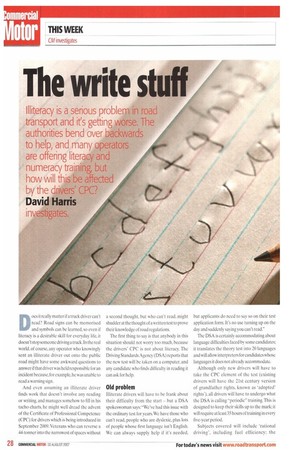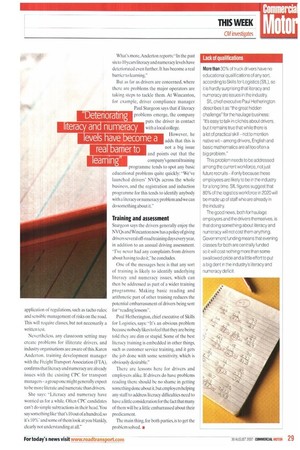The write stuff
Page 28

Page 29

If you've noticed an error in this article please click here to report it so we can fix it.
Illiteracy is a serious problem in road transport and it's getting worse. The authorities bend over backwards to help, and many operators are offering literacy and numeracy training, but how will this be affected by the drivers' CPC?
David Harris nvestigatc.
Does it really matter if a truck driver can't read? Road signs can be memorised and symbols can be learned, so even if literacy is a desirable skill for everyday life, it doesn't stop someone driving a truck. In the real world, of course, any operator who knowingly sent an illiterate driver out onto the public road might have sonic awkward questions to answer if that driver was held responsible for an incident because, for example, he was unable to read a warning sign.
And even assuming an illiterate driver finds work that doesn't involve any reading or writing, and manages somehow to fill in his tacho charts, he might well dread the advent of the Certificate of Professional Competence (CPC) for drivers which is being introduced in September 2009. Veterans who can reverse a 44-tormer into the narrowest of spaces without a second thought, but who can't read. might shudder at the thought of a written test to prove their knowledge of road regulations.
The first thing to say is that anybody in this situation should not worry too much, because the drivers' CPC is not about literacy. The Driving Standards Agency (DSA) reports that the new test will be taken on a computer, and any candidate who finds difficulty in reading it can ask for help.
Old problem
Illiterate drivers will have to be frank about their difficulty from the start — but a DSA spokeswoman says: "We've had this issue with the ordinary test for years. We have those who can't read, people who are dyslexic, plus lots of people whose first language isn't English. We can always supply help if it's needed. but applicants do need to say so on their test application form. It's no use turning up on the day and suddenly saying you can't read."
The DSA is certainly accommodating about language difficulties faced by some candidates; it translates the theory test into 20 languages and will allow interpreters for candidates whose languages it does not already accommodate.
Although only new drivers will have to take the CPC element of the test (existing drivers will have the 21st century version of grandfather rights, known as 'adopted' rights'), all drivers will have to undergo what the USA is calling "periodic" training. This is designed to keep their skills up to the mark; it will require at least 35 hours of training in every five-year period.
Subjects covered will include 'rational driving', including fuel efficiency; the application of regulations, such as tacho rules; and sensible management of risks on the road. This will require classes, but not necessarily a written test.
Nevertheless, any classroom setting may create problems for illiterate drivers, and industry organisations are aware of this. Karen Anderton, training development manager with the Freight Transport Association (FTA), confirms that literacy and numeracy are already issues with the existing CPC for transport managers— a group one might generally expect to be more literate and numerate than drivers.
She says: "Literacy and numeracy have worried us for a while. Often CPC candidates can't do simple subtractions in their head. You say something like 'that's 10 out of a hundred,so it's 10%; and some of them look at you blankly, clearly not understanding at all." What's more, Anderton reports: "In the past six to IC years literacy and numeracy levels have deteriorated even further. It has become a real barrier to learning."
But as far as drivers are concerned, where there are problems the major operators are taking steps to tackle them. At Wincanton, for example, driver compliance manager Paul Sturgeon says that if literacy problems emerge, the company puts the driver in contact with a local college.
However, he adds that this is not a big issue and points out that the company'sgeneral training programme tends to spot any basic educational problems quite quickly: "We've launched drivers' NVQs across the whole business, and the registration and induction programme for this tends to identify anybody with a literacy or numeracy problem and we can do something about it."
Training and assessment
Sturgeon says the drivers generally enjoy the NVQs and Wincanton now has a policy of giving drivers several off-road training days every year, in addition to an annual driving assessment. "I've never had any complaints from drivers about having to dolt," he concludes.
One of the messages here is that any sort of training is likely to identify underlying literacy and numeracy issues, which can then be addressed as part of a wider training programme. Making basic reading and arithmetic part of other training reduces the potential embarrassment of drivers being sent for readinglessons".
Paul Hetherington, chief executive of Skills for Logistics, says: "It's an obvious problem because nobody likes to feel that they are being told they are dim or stupid. Some of the best literacy training is embedded in other things, such as customer service training, and it gets the job done with some sensitivity, which is obviously desirable."
There are lessons here for drivers and employers alike. If drivers do have problems reading there should be no shame in getting something done about it, but employers helping any staff to address literacy difficulties need to have a little consideration for the fact that many of them will be a little embarrassed about their predicament.
The main thing, for both parties, is to get the problem solved. u






















































































































































































